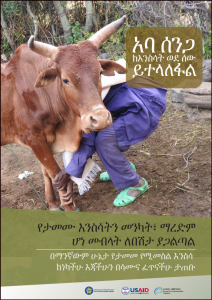Anthrax Prevention Campaign, Ethiopia
These materials were produced to be aired as part of the Zoonotic diseases prevention campaigns in selected places in Ethiopia.
Radio Spots
The messaging focuses on prevention methods such as avoiding touching, killing and eating of sick looking or dead animals. The spots are available in various languages: Amharic, Afaan Oromoo, and Tigrigna.
Avoid Eating Raw Meat, Spot 1 – Amharic, Afaan Oromoo, and Tigrigna
Avoid Eating Raw Meat, Spot 2, Amharic
Vaccination Radio Spot 1 – Amharic
Vaccination Radio Spot 2 – Amharic
Treatment Radio Spot – Amharic
Prevention Radio Spot – Amharic
Factsheet
Factsheet on Anthrax Prevention – Amharic
This fact sheet provides detailed information and contains key issues such as the causative agent of Anthrax, signs and symptoms both in animals and humans, modes of transmission, prevention methods, and actions to be taken when an animal or human beings get sick. It serves as reference material that can be used by human and animal health service providers, media professionals, teachers, and other stakeholders for effective communication with audiences for a better public health outcome on both animals and humans. Messages on the fact sheet are drawn from the national priority zoonotic diseases message guide. The fact sheet is available in Amharic language.
Brochure
Anthrax Prevention Methods Brochure – Amharic
This brochure provides messages on signs and symptoms for both animals and humans, mode of transmission, and prevention methods of selected zoonotic diseases. The messages are based on the national priority zoonotic disease message guide. It encourages preventive behaviors such as regular vaccination of livestock, avoiding eating and drinking raw animal products, not touching animals that may be sick, and washing hands with soap and water. Literate community members have intended audiences for messages on the material. It is part of a campaign called “Anthrax prevention Roadshow.”
Poster
This poster is developed to educate the community and encourage them to avoid touching, killing, and eating the meat of sick animals. It also encourages washing hands with soap and water after any contact with animals. The posters can be posted at public places such as health facilities, animal health clinics, schools, and other relevant public places. Messages on the poster are extracted from the national priority zoonotic diseases message guide. The poster is available in Amharic, Afan Oromo, and Tigrigna.
Source: Johns Hopkins Center for Communication Programs
Date of Publication: October 19, 2020

